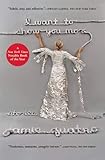
“The two worst sins of bad taste in fiction are pornography and sentimentality,” Flannery O’Connor wrote. “One is too much sex and the other too much sentiment. You have to have enough of either to prove your point but no more.”
Just enough of either to prove your point. O’Connor’s dictum applies perfectly to three writers creating great fiction set in the world of the Christian evangelical south: Jamie Quatro, April Ayers Lawson, and Michael Bible. Their stories are steeped in sex and spirits. They are willing to make imperfect characters do terrible things. They are better than most writers dramatizing God at the moment.
 I spoke with Quatro back in 2013, soon after her debut collection, I Want To Show You More, was published. She claimed unity with O’Connor in thinking “the role of the artist, even — no, especially — the Christian artist, is to present the world as it is, in all its complexity and ugliness. Sometimes, to make sin appear as such.” She sent me back to O’Connor herself, quoting that an artistic must find “distortions which are repugnant to him, and his problem [is] to make these appear as distortions to an audience which is used to seeing them as natural; and he may well be forced to take ever more violent means to get his vision across to this hostile audience.”
I spoke with Quatro back in 2013, soon after her debut collection, I Want To Show You More, was published. She claimed unity with O’Connor in thinking “the role of the artist, even — no, especially — the Christian artist, is to present the world as it is, in all its complexity and ugliness. Sometimes, to make sin appear as such.” She sent me back to O’Connor herself, quoting that an artistic must find “distortions which are repugnant to him, and his problem [is] to make these appear as distortions to an audience which is used to seeing them as natural; and he may well be forced to take ever more violent means to get his vision across to this hostile audience.”
 For Quatro, that violence is not through wounds and blood, but in the “coexistence of the erotic and spiritual, the sexual and sacred…It’s why lovers often talk in such exalted terms, say things like they want to eat one another, to be one another. An artist must probe into these moments. She cannot look away.” I find the same spiritual sense in Lawson, whose sleek yet complex debut, Virgin and Other Stories, arrives later this year — though I think the Christian pulse is a bit more subdued. More shadow than statue.
For Quatro, that violence is not through wounds and blood, but in the “coexistence of the erotic and spiritual, the sexual and sacred…It’s why lovers often talk in such exalted terms, say things like they want to eat one another, to be one another. An artist must probe into these moments. She cannot look away.” I find the same spiritual sense in Lawson, whose sleek yet complex debut, Virgin and Other Stories, arrives later this year — though I think the Christian pulse is a bit more subdued. More shadow than statue.
I would place Michael Bible’s novel Sophia somewhere on the spectrum between Quatro and Lawson. Sophia arrives in fast, crisp sentences: first-person narrated, increasingly surreal vignettes that follow the misadventures of Reverend Alvis Maloney. He might have been a Flannery O’Connor character if there had been someone to pray for him every minute of his life. He’s sour and obscene and obsessed with saints.
In short, he’s worthy of a book, and Bible lets him loose. There are other characters in this novel, friends and lovers and enemies like Eli, Tuesday, Boom, Finger, Darling and Mayor Dick Dickerson, who owns a pawn shop and slaps bad employees with his antique cane — but this is Maloney’s show. He’s the self-admitted “lazy priest of this town’s worst church, nearly defrocked for lascivious behavior with female parishioners.” He’s the kind of pastor who finishes his prayers with “Amen?”, profoundly unsure about God but profusely hoping to figure it out.
“I want to die for the King of Kings,” he says, “but can’t quite get it right.” His examples are a litany of saints, described in prose-poetic legend, whose deaths are each more eccentric and violent than the former. His friend Eli asks him why he needs to read so many stories, and Maloney says “I’m trying to find a way to die with honor.” Or, more accurately, as he later says: “I want so bad to be a saint but I’m a coward and barely Christian.”
I might hate Maloney in the hands of another writer — I might find his jaunty obscenities tiresome — but Bible is a real talent. I’ll listen to a writer who offers paragraphs like this:
Behind the abandoned hospital on a peach tree hangs one rotten peach. Two black wizards approach dumpsters behind the church, black hoods and staffs. They are cosplay people maybe worshiping a comic book. They cast spells on each other, high five, chest bump. They pretend the peach is forbidden fruit. They wear jester’s shoes and speak Elizabethan. They try to light the Sunday sports section on fire with their eyes.
Sophia is a whirlwind. Maloney often doesn’t know what to do with himself, but he’s a character in constant awe, who prays almost as much as he has sex, who says “Lord, you give us tornadoes and purple sunrises. We praise your beautifully illogical ways. You performed great miracles long ago and nothing since. Why such confusion? We love you, wonderful idiotic Lord.”
 Maloney loses more than a few lovers in Sophia but moves on, following Eli on the professional chess circuit, traveling across the country and back but staying grounded by his odd fantasies. The Holy Ghost is a woman that he flirts with nightly — and often hopes for more. Imagine Flaubert’s The Temptation of Saint Anthony set behind a Waffle House.
Maloney loses more than a few lovers in Sophia but moves on, following Eli on the professional chess circuit, traveling across the country and back but staying grounded by his odd fantasies. The Holy Ghost is a woman that he flirts with nightly — and often hopes for more. Imagine Flaubert’s The Temptation of Saint Anthony set behind a Waffle House.
When one character quips that Maloney should go to church, he responds “I am church.” I found his response less solipsistic than honest. If the body is a temple, it must occasionally get dirty, and Maloney gets filthy. At many points in the novel it is unclear whether he is experiencing a waking nightmare — including when Mayor Dickerson gains a penchant for kidnapping and brandishing a gun.
Bible makes a nice transition from plot-by-osmosis to some good old-fashioned chase scenes, but the real star of Sophia is Maloney’s jaw. Maloney never quite takes himself seriously — it is really difficult to find God holy if you don’t also find existence a bit hilarious — though Sophia does end on a note of grace. Flannery would be proud.
I invoke O’Connor here for obvious reasons, but also because she is a convenient contrast. O’Connor was a Catholic writing about evangelicals; Quatro, Lawson, and Bible are looking at the evangelical world from within. As good as “Parker’s Back” might be — I’m willing to say that it is a perfect story — it pivots from a Catholic theological position. These three new writers of the Christian evangelical south are operating more from a place of inhabitation than analysis — although they document similar messes. Sophia lives in a world where a pastor concludes “Too much beauty makes me sick.” Amen.








